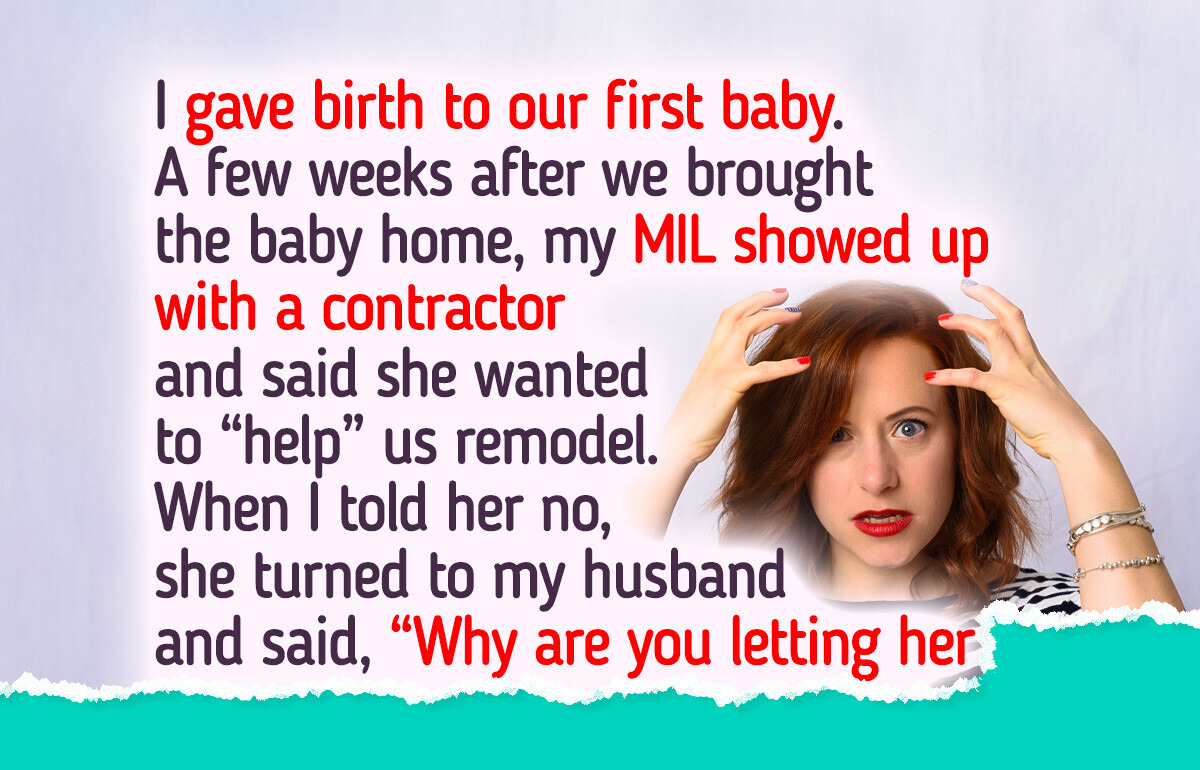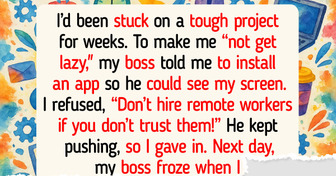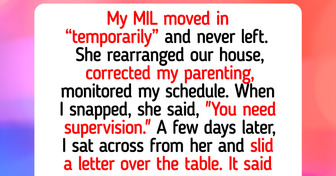Before you wrote this letter to Bright Side, did you CALL AN ATTORNEY? YOUR husband is a pussy. YOUR MIL is an "I AM ALWAYS RIGHT" even when I am not, witch. He will continue to let her walk all over you, and NOT discuss anything WITH you. It sucks, but getting out now, is preferable to dragging it out. As long as she is around, she will make you second guess yourself, and bully your husband into giving in to her. You know, and so does she, that she wasn't trying to help you. She was trying to interfere, so that she could (possibly) say, oh it's too much for the baby, let ME take him to MY house. Mark my words, she will be in your way, every chance she gets.
I Refuse to Let My MIL Renovate Our House After I Just Gave Birth

We received a letter from a new mom who thought the hardest part would be giving birth. But just weeks into postpartum life, her retired mother-in-law showed up with renovation plans and a contractor. What followed was a clash over control, boundaries, and what “help” really means when you’re already stretched to your limit.
Emily sent us a letter.
Hi Bright Side!
I just gave birth to our first baby, and between recovery, sleepless nights, and figuring out new motherhood, I’ve been completely overwhelmed. Our home is the only place where I feel somewhat in control, but even that was nearly taken from me.
A few weeks after we brought the baby home, my mother-in-law started making comments like, “We should knock this wall down,” or “This room would be so much better as a nursery.” At first, I brushed it off, thinking she was just excited. But then, out of nowhere, she showed up with a contractor without asking me, and announced she wanted to start “helping” us remodel.
I was stunned. Not only had I never agreed to this, but I was still healing, trying to breastfeed, and running on two hours of sleep a night. The idea of dust, noise, and strangers walking around my home made me feel physically ill.
When I told her absolutely not, she seemed confused. Then annoyed. She turned to my husband and said, “Why are you letting her decide everything?” That comment stung, especially because I later found out my husband had already told her she could go ahead with the plans. Without even asking me.
Now I feel completely dismissed. I understand my MIL wants to help, but I needed support, not sledgehammers. I feel like my voice is being drowned out just when I need peace and control the most.
Was I wrong for putting my foot down? I don’t want to create conflict, but I can’t have my safe space turned upside down, especially right now.
—Emily
Here’s what we think.
- Your home, your rules—especially postpartum.
After giving birth, your home should be a sanctuary, not a construction zone. It’s perfectly reasonable to say no to disruptive plans while you’re healing and adjusting to a new baby. Postpartum recovery can take up to 6–8 weeks or more, and peace and routine are essential during this time
- Communicate directly—and clearly—with your husband.
The biggest breach here wasn’t just your MIL bringing in contractors—it was your husband agreeing behind your back. Sit him down and explain calmly how that decision affected your trust and emotional well-being. Marriage is a team, especially when raising a child, and decisions that impact the household must be mutual.
- Set firm but respectful boundaries with your MIL.
You don’t need to be aggressive, but you do need to be assertive. Try something like, “We appreciate your excitement, but renovations are not something we’re ready for. I’ll let you know if and when we want to revisit the idea.” Setting these boundaries now ensures fewer oversteps in the future.
- Let others help you on your terms.
If your MIL wants to be involved, offer alternative ways she can support you—maybe by cooking a meal, running errands, or watching the baby while you nap. Reframing “help” into something actually helpful (and welcome) can reduce resentment on both sides while giving you space to breathe. - Don’t second-guess your instincts.
Feeling overwhelmed doesn’t mean you’re being dramatic—it means you’re human. Postpartum hormones are real, and even small disruptions can feel enormous. Your mental health matters just as much as your baby’s, and it’s okay to prioritize a calm, stable environment right now.
You’ve been through a lot lately, Emily: physically and emotionally. Whatever you decide, just know you deserve to feel heard, respected, and supported, especially during such a vulnerable chapter in life.
Comments
Related Reads
10 Parents Who Take Boundaries and Smash Them Into Dust

10 Kids Whose Candid Confessions Turned Lives Upside Down

14 People Who Went From 10 to 0 in an Instant

11 Nannies Who Faced More Twists Than a Hollywood Thriller

My Ex Was Wasting Our Son’s College Money on His Stepdaughter

I Refuse to Be My Mom’s Retirement Plan After She Chose to Stay Home Her Whole Life

12 Heartwarming Moments That Show How Family Kindness Saves Lives

My Boss Demanded Me to Install Spyware, So I Taught Him What Technology Really Is

I Refuse to Let My MIL Be in My Life, So I Gave Her One Last Payback

I Refused to Put My Health at Risk Because of My Job, Now HR Got Involved

I’m Tired of Being the One My Family Turns to for Money Just Because They Raised Me

16 Families Whose Everyday Life Is Basically a Sitcom






